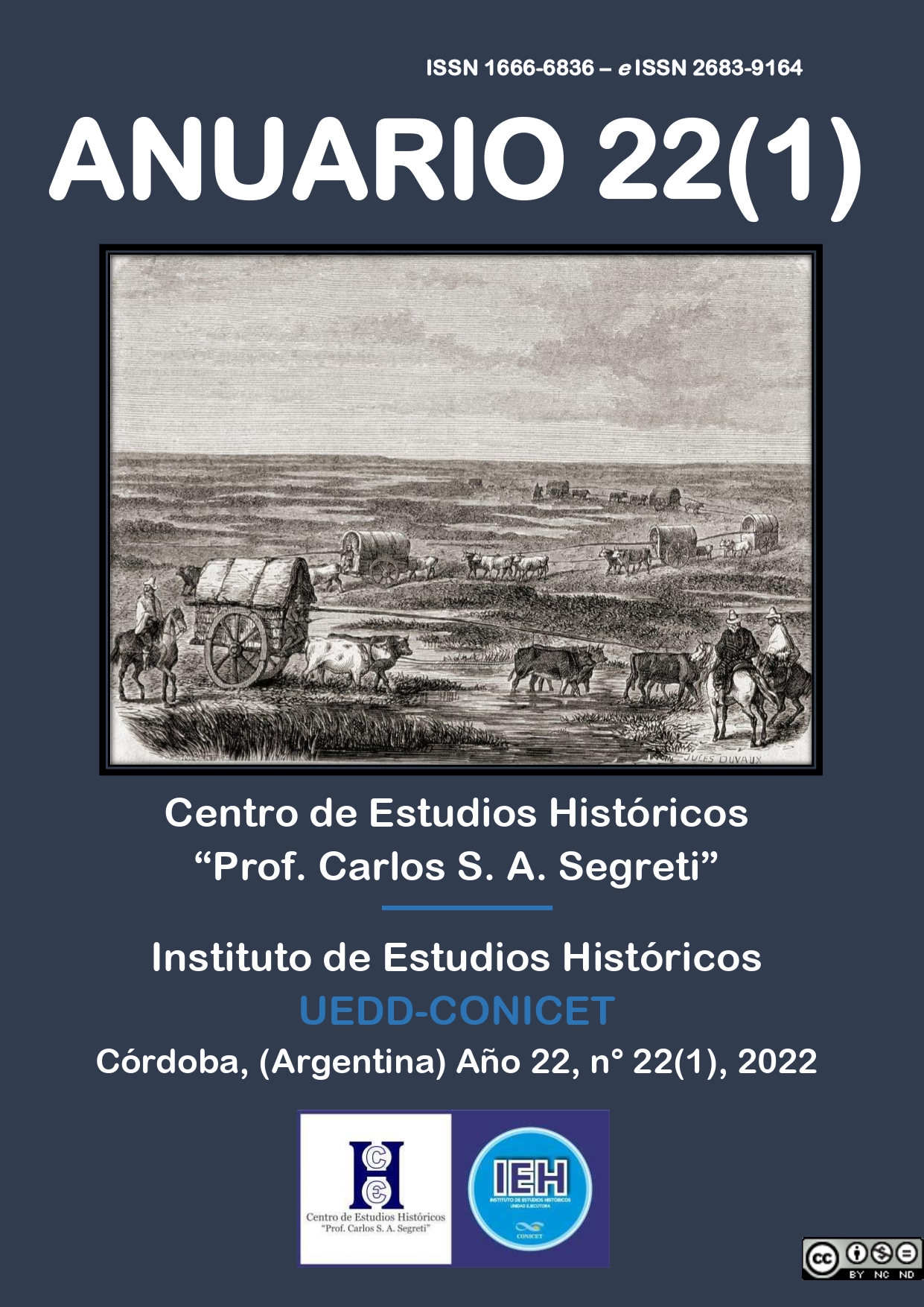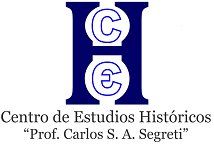The aborted god. Procreation between divinity and matter in the Gnostic exegesis of Jewish and Platonic traditions
Keywords:
History of Religion - Gnosticism - Abortion – Middle PlatonismAbstract
The present communication will expose evidence by which the Gnostic texts present an original vision of the platonic demiurge, product of a precise exegesis of sources coming from different literary corpus well known by the authors. For this we will take one of the most controversial subjects present in the Gnostic texts of the Nag Hammadi Collection, the shapeless, strange, aborted god (ϩⲟⲩϩⲉ - On the origin of the world (NH II, 5) 99, 9 and 26, The hypostasis of Archons 87, 28; 94, 15 and Excerpts of Theodotus 68). Our objective is to show that this concept, of great semantic richness for Gnostic authors, is anchored in conceptual interpretations from both, the Jewish tradition (Genesis 6,4, Genesis Rabba 26, 7, 1 Henoch VI, 1-XVI, 4 and the Book of Giants (4Q Book of Giants)) as well as Middle Platonic writings by Plutarch, Atticus, and Numenius.
Downloads
References
BARC, Bernard, L’Hypostase des Archontes. Traité gnostique sur l’origine de l’homme, du monde et des archontes (NH II, 4), (BCNH 5), Québec-Louvain, Les Presses de l’Université Laval-Peeters, 1980.
_____, « Samaël-Saklas-Yaldabaôth », Bernard BARC (ed.), Colloque International sur les textes de Nag Hammadi (Québec, 22-25 août 1978), Québec-Louvain, Presses de l’Université Laval-Peeters, 1981.
_____, « L’Hypostase des Archontes NH II, 4 », Jean-Pierre MAHE y Paul-Hubert POIRIER, (eds.), Écrits Gnostiques, París, Gallimard, 2007, 205-295.
BARRY, Catherine, FUNK, Wolf-Peter, POIRER, Paul-Hubert, TURNER, John D., Zostrien (NH VIII, 1), (BCNH 24), Québec-Louvain-París, Les Presses de l’Université Laval - Peeters, 2000.
BLACK, Matthew (trad.), The Book of Enoch or I Enoch. A new english translation, Leiden, Brill, 1985.
BLANC, Cecile, Origène, Commentaire sur Saint-Jean, (SC 222), París, 2006 (1975).
CAQUOT, André (trad.), “I Hénoch”, André DUPONT-SOMMER y Marc PHILONENKO (dir.), La Bible. Écrits intertestamentaires, París, Gallimard, 1987.
CERIONI, Lavinia. Revealing Women. Feminine Imagery in Gnostic Christian, Turnhout, Brepols, 2021.
CHERNISS, Harold y HELMBOLD, William C. (eds.), Plutarque, Moralia, (LCL 406) Cambridge-Londres, Heinemann, 1968.
CROUZEL, Henri y SIMONETTI, Manlio (eds.), Origène, Traité des Principes, (SC 252), París, Cerf, 1978.
CRUM, Walter E., (comp.), A Coptic Dictionary, Oxford, Clarendon Press, 1962².
De PLACES, Edouard (ed.), Numenius, Fragments, París, Belles Lettres, 1973.
_____, Atticus, Fragments, París, CUF, 1977.
DILLON, John, The Middle Platonists. A Study of Platonism 80 B.C. to A. D. 220, Londres, Duckworth, 1977.
GARCÍA BAZAN, Francisco, Oráculos Caldeos y Numenio, Madrid, Gredos, 1991.
GARCÍA MARTINEZ, Florentino, Textos de Qumrán, Madrid, Trotta, 20096.
HARL, Marguerite (ed.), La Bible d’Alexandrie. La Genèse, París, Cerf, 1986.
JASTROW, Marcus, A Dictionary of Targumin, Talmud of Babli and Yerushalmi and the Midrashic Literature, Nueva York, BN Publishing, 2004.
KING, Karen, What Is Gnosticism?, Cambridge, Mass. - Londres, Harvard University Press, 2003.
Le BOULLUEC, Alain (ed.), Clément d’Alexandrie, Les Stromates. Stromate IV, (SC 428), París, Cerf, 1997.
Le BOULLUEC, Alain (ed.) y VOULET, Pierre (trad.), Clément d’Alexandrie, Les Stromates. Stromate V, (SC 278), París, Cerf, (1981) 2006.
LIDDELL, Henry D. y SCOTT, Robert (comp.) A Greek-English Lexicon, Oxford, Clarendon Press, 1996.
MAHÉ, Jean-Pierre y POIRIER, Paul-Hubert, “Introduction” Jean Pierre MAHE y Paul-Hubert POIRIER, (eds.), Écrits Gnostiques, París, Gallimard, 2007, ps. XV-LXXXVIII.
MARCOVICH, Miroslav (ed.), Hippolyte, Refutatio Omnium Haeresium, Berlín-Nueva York, De Gruyter, 1986.
MARUANI, Bernard y COHEN-ARAZI, Albert, Midrach Rabba. Genèse Rabba, París, Verdier, 1987.
MILIK, Józef (trad.), The Books of Enoch. Aramic fragments of Qumrân cave 4, Oxford, Clarendon Press, 1976.
MONDESERT, Claude (trad.), Legum Allegoriae I-III, introduction, traduction et notes par, (OPhA 2, París, Cerf, 1962.
MOSES, André (ed.), Philon d’Alexandrie, Quod Deus sit immutabilis (OPhA 8), París, Cerf, 1963.
OPSOMER, Jan, « Demiurges in Early Imperial Platonism » Rainer HIRSCH-LUIPOLD (éd.), Gott und die Gotter bei Plutarch. Gotterbilder - Gottesbilder – Weltbilder, Berlín -Nueva York, Waiter de Gruyter, 2005, 51-99.
PAINCHAUD, Louis y FUNK, Wolf-Peter, L’Écrit sans Titre, (BCNH 21), Québec-Louvain-París, 1995.
PAINCHAUD, Louis, «L’Écrit sans Titre (NH II, 5 et XIII, 2) », Jean-Pierre MAHE y Paul-Hubert POIRIER, (eds.), Écrits Gnostiques, París, Gallimard, 2007, 401-465.
PATTERSON, Stephen, “Jesus Meets Plato: The Theology of the Gospel of Thomas,” FREY, Jörg et al. (eds), Das Thomasevangelium, Entstehung – Rezeption – Theologie, BZNW 157, Berlín, de Gruyter, 2008, pp. 181-205.
RAHLFS, Alfred (ed.), Septuaginta, 2 volumes, Stuttgart, Deutsche Biblegesellschaft, 2004.
RASIMUS, Tuomas, Paradise Reconsidered in Gnostic Mythmaking Rethinking Sethianism in Light of the Ophite Evidence, (NHMS 68), Leiden-Boston, Brill, 2009.
ROUSSEAU, Adelin y DOUTRELEAU, Louis (eds.), Irénée de Lyon, Adversus haereses, (SC 264), París, Cerf, 1979.
SAGNARD, François (ed.), Clément d’Alexandrie, Extraits de Théodote, (SC 23), París, Cerf, 1970.
SOUVILLE, Auguste (ed.), Hippolyte, Philosophumena ou Réfutation de toutes les hérésies, Milán, 1988.
STROUMSA, Gedaliahu A. G, Another Seed : Studies in Gnostic Mythology, Leiden, Brill, 1984.
TARDIEU, Michel, Trois mythes gnostiques. Adam, Éros et les animaux d’Égypte dans un écrit de Nag Hammadi (II, 5), París, Études Augustiniennes, 1974.
THACKERAY, Henry St. J. (trad.) Josephus in nine volumes IV. Jewish Antiquities, books I-IV, Cambridge Mass. y Londres, Heinemann-Harvard University Press, 1961.
THOMASSEN, Einar, Coherence of “Gnosticism”, Berlín, De Gruyter, 2020.
TUVAL, Michael ““Συναγωγὴ γιγάντων” (Prov 21:16). The Giants in the Jewish Literature in Greek”, GOFF, Matthew, STUCKENBRUCK, Loren T. y MORANO, Enrico (eds), Ancient Tales of Giants from Qumran and Turfan Contexts, Traditions, and Influences, Tübingen, Mohr Siebeck, 2016, pp. 41-57.
VEILLEUX, Armand (trad.), La première apocalypse de Jacques (BCNH 17), Québec, Les Presses de l’Université Laval, 1986.
VEILLEUX, Armand y FUNK, Wolf-Peter, « Deux Apocalypses de Jacques », Jean-Pierre MAHE y Paul-Hubert POIRIER, (eds.), Écrits Gnostiques, París, Gallimard, 2007, 725-776.
WENDLAND, Paul (ed.). Hippolyte, Refutatio Omnium Haeresium, Hildesheim-Nueva York, 1977.
WILLIAMS, Michel, Rethinking « Gnosticism», New Jersey, Princeton University Press, 1996, pp. 5-20.
WHITTAKER, John (ed.) y LOUIS, Pierre (trad.), Alcinoos, Didaskalikos, París, Belles Lettres, 1990.
YOSHIKO REED, Annette, Fallen Angels and the History of Judaïsm and Christianity. The Reception of Enochic Literature, Cambridge y New York, Cambridge University Press, 2005.
Downloads
Published
Issue
Section
License
Copyright (c) 2022 Mariano Troiano

This work is licensed under a Creative Commons Attribution-NonCommercial-NoDerivatives 4.0 International License.
Aquellos autores/as que tengan publicaciones con esta revista, aceptan los términos siguientes:
- Los autores/as conservarán sus derechos de autor y garantizarán a la revista el derecho de primera publicación de su obra, el cuál estará simultáneamente sujeto a una Licencia de reconocimiento de Creative Commons. Se puede compartir, copiar, distribuir, ejecutar y comunicar públicamente la obra, siempre que: a) se cite la autoría y la fuente original de su publicación (revista, editorial y URL de la obra); b) no se use para fines comerciales; c) no se altere, transforme o genere una obra derivada a partir de esta obra.
- Los autores/as podrán adoptar otros acuerdos de licencia no exclusiva de distribución de la versión de la obra publicada (p. ej.: depositarla en un archivo telemático institucional o publicarla en un volumen monográfico) siempre que se indique la publicación inicial en esta revista.
- Se permite y recomienda a los autores/as difundir su obra a través de Internet (p. ej.: en archivos telemáticos institucionales o en su página web) después del proceso de publicación, lo cual puede producir intercambios interesantes y aumentar las citas de la obra publicada. (Véase El efecto del acceso abierto).









